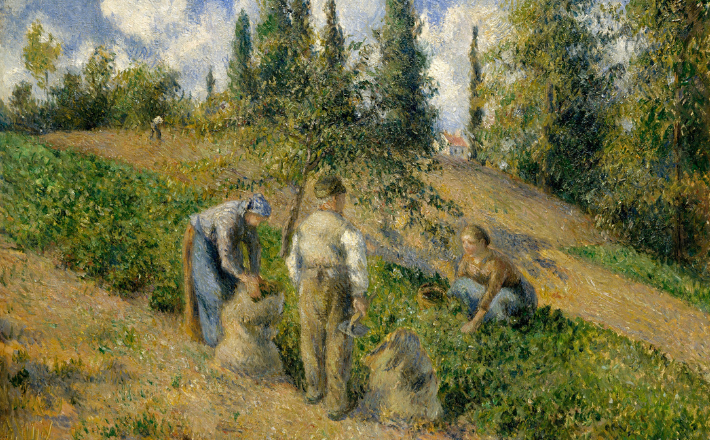Commentary on Galatians 6:[1-6] 7-16
The text for this Sunday contains two distinct parts that both engage a community in deep dissent and dissonance with the prevailing propaganda of peace and prosperity through imperial world rule. At the close of the parenetic section, Galatians 5:1–6:10, Paul in 6:7–10 delivers a message of hope and faithful perseverance that is deeply personal and pastoral at once. The following six verses are the final statement of the letter, written with Paul’s “own hand.” In visibly “large letters” (6:11), he passionately reiterates his main point and discloses some of the backstory (6:11–16). What is this whole debate about circumcising the male Galatians actually about? We will start here.
A community under pressure (6:11–13)
How can one find the courage and persistence not to cave in to the demands of the established order? Its local advocates and agents are everywhere and suggest “reasonable accommodation.” If you are Abraham’s children and heirs (Galatians 3:29), they say, and if you want to worship his One God alone, why not get circumcised the proper Jewish way and be exempt from emperor worship, as all Jews are? Right now, your newly practiced abstention from worshiping “God Caesar” and the civic gods looks dangerously close to political sedition.1 Why draw unnecessary attention by sporting a most puzzling Jew-Gentile identity that transgresses all normative codes of civic conduct, all orderly (binary) distinctions?
The situation in Galatia is tense. Repercussions are looming. There are people willing to enforce circumcision (anagkazousin, 6:12; New Revised Standard Version: compel) to bring the Jesus-following Galatians back to their right minds. For why should they, Paul’s ubiquitous but never-named “opponents” ask, pay the price for this “unlicensed” opting-out of emperor religion by non-Jews that will most likely fall back on the Jewish or even the whole civic community? They don’t want to be persecuted for the cross of the Messiah/Christ, Paul matter-of-factly states (6:12). Their motives are much more pragmatic than based on pure love of Torah/Law. All that matters for them is an acceptable public appearance, a good showing in the (circumcised) flesh to boast about (6:12–13) and contain the conflict.
Resistance fatigue and the seed of hope (6:7–10)
Living against the grain of the dominant order and its ironclad hierarchical binaries (see 3:23–29 and 5:13–26) apparently is taking its toll. Symptoms of resistance fatigue and a sense of futility seem to be setting in among the Galatian Jesus-followers, who are getting weary to the point of giving up (6:9). Paul finds words of encouragement that are not lofty and dogmatic, but perplexingly down-to-earth. Entering the world of farming, he taps into deep sources of wisdom shared across cultures since ancient times, especially among native communities.
Seeds and soils teach the most vital life-lessons that need to be remembered for our and God’s sake: Do not be deceived; God is not mocked, for you reap whatever you sow (6:7). Germination can take a long time, though. It stays invisible and thus disputable. It is not on us to “fabricate” the growth or to see immediate results, for the earth and the seeds on their own and in their own time (kairō idiō, 6:9; New Revised Standard Version: at harvest time; see also Mark 4:27–28) set free the power of growth and fruit-bearing.
Our part is just to put the right seed into the right ground, namely to do what is right (6:9) and to work for the good of all (6:10), especially the family of faith as the new trans-binary community of Abraham’s children from different nations and birthplaces (3:29).
Spirit as matrix of indestructible life
It is remarkable that Paul refers to the “dark matter” of earth and soil here as a metaphor for the Spirit, the matrix of life that grants growth to the new creation. The innate life-giving and restorative powers of the natural world as God’s (rather than the emperor’s) creation are sources of hope. Tiny seeds and crumbs of fertile topsoil with billions of invisible microorganisms at work in them can teach us faith as trust in the prevailing power of transformation and life-giving. Love, joy, and peace (5:22) are the seeds of life, enduring life (zoe aionion, 6:8; New Revised Standard Version: eternal life) that is not terminated by corruption and extinction.
Once again: Flesh
The Flesh, on the other hand, is the ravenous impulse of selfishness, and competition is feeding into the dominant order of violence, hatred, and other-contempt, heading into self-destruction (see also 5:15). This includes the binary order that, for example, keeps Jews and other nations subdued by Rome categorically apart, sprouting perpetual distrust and enmities between self and other, us and them (see also 5:13–26). Sowing to your own flesh (6:8) by ignoring the needs of others, or by declaring their difference the limit of our shared humanity, means cultivating the Flesh as the metaphorical soil that brings forth a harvest of death and decay (6:8).
Again, we have to distinguish between Flesh (uppercase) as destructive binary principle (6:8b) and the flesh (lowercase) of the body (6:8a). The latter may undergo, for example, circumcision that, in this particular case for Paul, does not affirm legitimate difference but deadly division. Both meanings of F/flesh are present in one single sentence here, but failing to tell them apart may produce the fallacious impression that Paul sees the human body per se as source of eternal corruption and damnation.
Kairos and time to plant an apple tree
Two times our text uses the Greek term kairos, which stays hidden in the New Revised Standard Version translation as “harvest time” in 6:9 and “opportunity” in 5:10. Yet kairos is the special time within ordinary time when eternity redefines our mundane reality. For Paul it matters that we already now live in this kairos time that is inseminated by the Spirit and the new creation (6:9, 15), moving toward the harvest of eternal life (6:9). This is not a life above or apart from the earth in a faraway realm of otherworldliness, but the faithful trust and experience, if often fleeting, that another world is possible and already taking root while we are still trying to spread its seeds.
The old world order (kosmos; 6:14) is crucified to me, Paul declares, and I am crucified to it, including its decay-infested fantasies of peace through warfare and superiority, and of prosperity through domination and exploitation. The binary polarizations of either circumcision or foreskin and all they stand for (see also 3:28) are invalidated by the new creation and its different measuring rod (kanon, 6:15; New Revised Standard Version: rule) that means peace and mercy for all (6:16). Paul refuses to walk any longer in the marching columns (stoicheo; 6:16) of the binary order/Flesh. In Martin Luther’s words, Paul makes a pledge to plant an apple tree (or seed) right now—not despite but because of what we know: that the world in its old shape will have to end.
Notes
- For the political and civic implications of the circumcision demand in Galatia, see Brigitte Kahl, Galatians Re-Imagined: Reading with the Eyes of the Vanquished (Minneapolis: Fortress, 2010), 222–227.


July 6, 2025